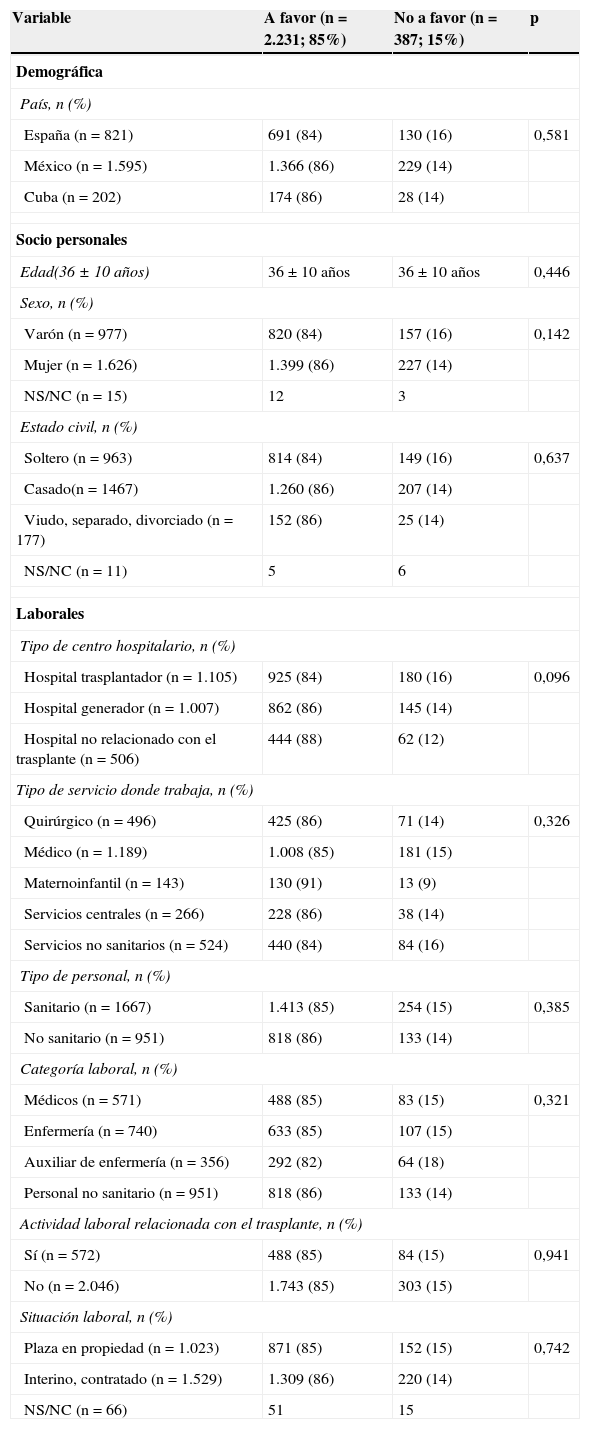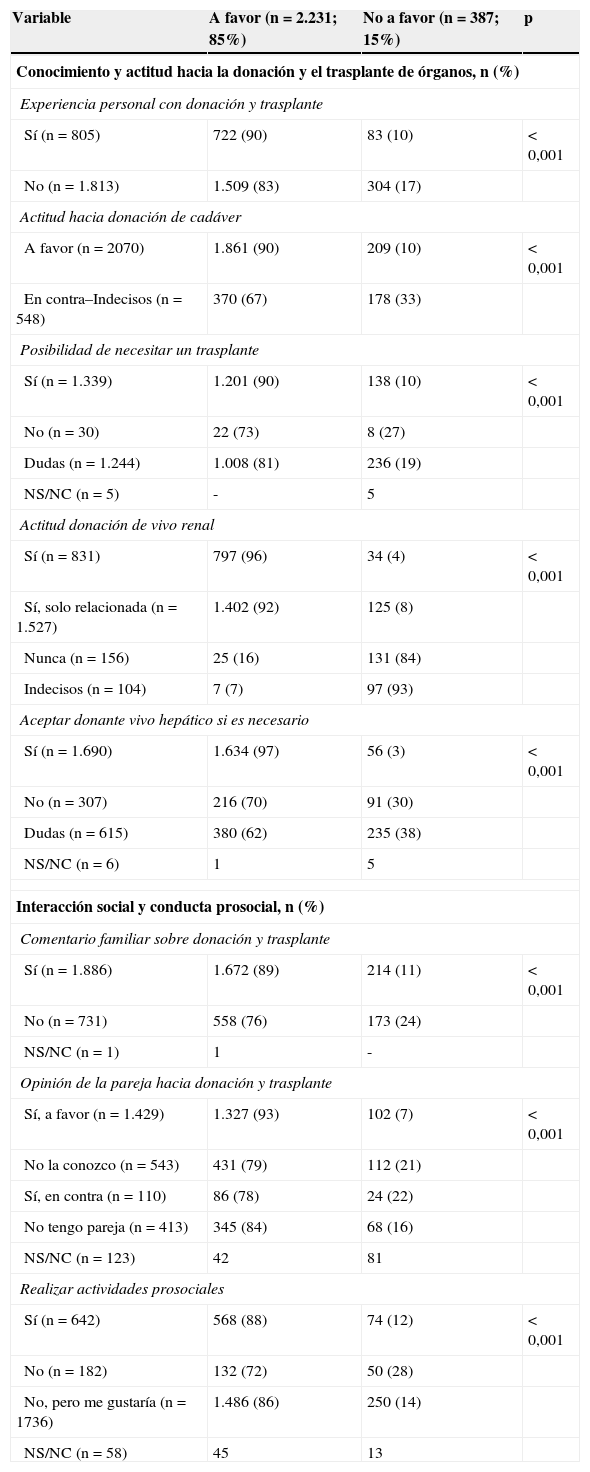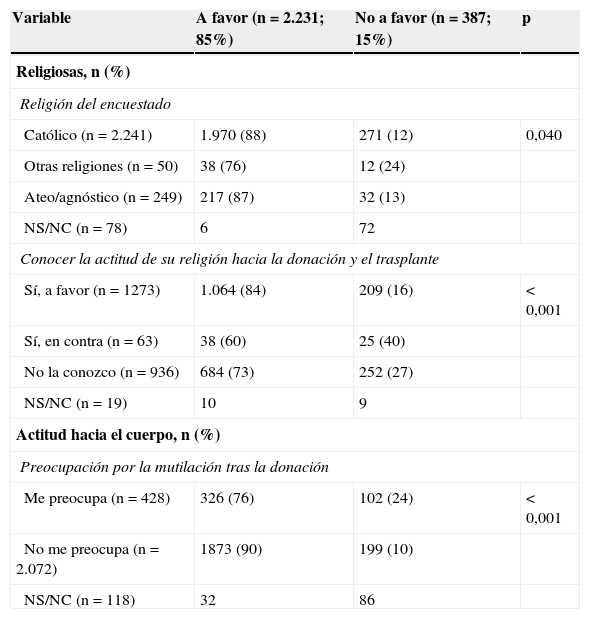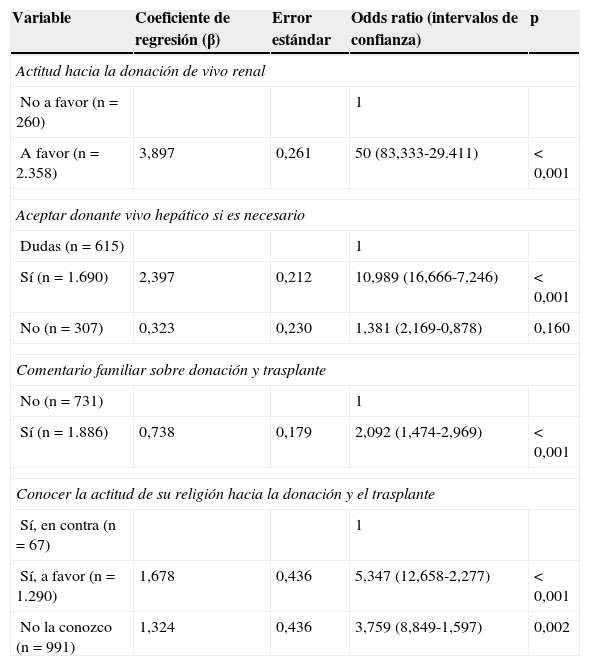Dado el déficit de hígados para trasplante se está potenciando la donación de vivo hepática (DVH) en el ámbito de habla hispana. Para ello es fundamental que los profesionales de centros hospitalarios estén a favor de dicha donación, dado que son una pieza clave en este tratamiento y son un grupo generador de opinión ante la población.
Objetivo Analizar la actitud hacia la donación de vivo hepática (DVH) entre el personal hospitalario de centros sanitarios de España y Latinoamérica
Material y métodoDel «Proyecto Colaborativo Internacional Donante» se seleccionaron 10 centros hospitalarios, 3 de España, 5 de México y 2 de Cuba. Muestra aleatoria y estratificada por tipo de servicio y categoría laboral. Se valora la actitud hacia la DVH a través de un cuestionario validado de aspectos psicosociales. El cuestionario fue anónimo y autoadministrado. Estadística: test de la t de Student, de la χ2 y análisis de regresión logística.
ResultadosDe los 2.618 profesionales encuestados, el 85% (n=2.231) está a favor de la DVH relacionada, y de ellos el 31% (n=804) a favor de la DVH no relacionada. No se asocian con dicha actitud ni el país del encuestado, ni las variables sociopersonales ni las laborales.
Los factores que se asocian a la actitud favorable hacia la DVH relacionada son haber tenido experiencia personal con la donación y el trasplante (p<0,001), estar a favor de la donación de cadáver (p<0,001), creer en la posibilidad de necesitar un trasplante para sí mismo (p<0,001), estar a favor de la donación de vivo renal (p<0,001), aceptar un hígado procedente de donante vivo si fuera necesario (p<0,001), haber comentado con la familia sobre la donación y el trasplante (p<0,001), la actitud favorable de la pareja hacia la donación y el trasplante (p<0,001), realizar actividades de tipo prosocial (p<0,001), ser católico (p=0,040), creer el encuestado que su religión está a favor de la donación y el trasplante (p<0,001), y no preocuparle la posible mutilación del cuerpo tras la donación (p<0,001).
ConclusionesLa actitud hacia la DVH referida entre el personal hospitalario de España y Latinoamérica es favorable, y está asociada con factores relacionados directa e indirectamente con la donación y el trasplante, factores familiares, religiosos y de actitud hacia el cuerpo.
Given the lack of a sufficient number of livers available for transplantation, living liver donation (LLD) is being developed in the Spanish-speaking world. To do this, it is essential that health workers in hospitals are in favor of such donation, given that they are a key component in this treatment and that their attitudes influence public opinion.
ObjectiveTo analyze attitude toward LLD among hospital personnel from healthcare centers in Spain and Latin America.
Material and methodTen hospitals were selected from the «International Donor Collaborative Project»: 3 from Spain, 5 from Mexico and 2 from Cuba. Random sampling stratified by type of service and job category was used. Attitudes to LLD were evaluated through a validated questionnaire on psychosocial aspects. The questionnaire was anonymous and self-administered. Statistical tests consisted of Student's T test, the chi-square test and logistic regression analysis.
ResultsOf the 2,618 employees surveyed, 85% (n=2,231) were in favor of related LLD; of these, 31% (n=804) were in favor of unrelated LLD. No association was found between the country of the interviewed, personal-social variables or work-related variables.
The following factors were associated with a favorable attitude toward related LLD donation: having had personal experience of donation and transplantation (P<.001); being in favor of deceased donation (P<.001); believing that one might need a possible transplant (P<.001); being in favor of living kidney donation (P<.001); being willing to accept a liver from a living donor (P<.001); having discussed the matter of donation and transplantation within the family (P<.001) and with one's partner (P<.001); carrying out pro-social type activities (P<.001); being Catholic (P=.040); believing that one's religion is in favor of donation and transplantation (P<.001); and not being concerned about the possible mutilation of the body after donation (P<.001).
ConclusionsHospital personnel from Spain and Latin America had a favorable attitude toward LLD, which was associated with factors directly and indirectly related to donation and transplantation, family and religious factors, and attitudes toward the body.
Artículo
Comprando el artículo el PDF del mismo podrá ser descargado
Precio 19,34 €
Comprar ahora











